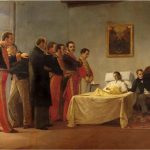 If the notion of political representation comes to the fore at the point at which Latin America comes to throw off its colonial masters, this is because the spokesmen of the independence movement were those who most keenly felt its lack. For them, being marginalized from the official hierarchies of political power threatened their economic freedoms (regarding taxation and commerce etc.) but also left them helpless in the face of a crisis of governance in which their own position (much higher than slavery) was at risk. For others, rather more basic freedoms were still at stake.
If the notion of political representation comes to the fore at the point at which Latin America comes to throw off its colonial masters, this is because the spokesmen of the independence movement were those who most keenly felt its lack. For them, being marginalized from the official hierarchies of political power threatened their economic freedoms (regarding taxation and commerce etc.) but also left them helpless in the face of a crisis of governance in which their own position (much higher than slavery) was at risk. For others, rather more basic freedoms were still at stake.
4. Independence Narratives, Past and Present
The notion of political representation comes to the fore at the point at which Latin America comes to throw off its colonial masters.
You should also watch the interview video with Max Cameron. Then there are the student-made videos.
- Alexander Dawson, “Independence Narratives, Past and Present”. Latin America Since Independence: A History with Primary Sources. 2nd Edition. New York: Routledge, 2014. 11-42.
Note that each chapter of the textbook comes with online resources on the publisher's website. Simply click on the relevant tab for this week's reading.
Documents:
- Simón Bolívar, "Letter from Jamaica" (1815). (Dawson 22-24; Spanish original; translation online)
- José Martí, "Our America" (1891). (Dawson 24-30; Spanish original [see also]; translation online)
- Hugo Chávez, Speech at the Opening of the XII G-15 Summit (2004). (Dawson 30-36; Spanish original [see also]; translation online)
Chávez in Context
This conversation with Max Cameron (Political Science, UBC) puts former Venezuelan leader Hugo Chávez in context by discussing him in relation to the Bolivarian tradition, and the long struggle for inclusion in Latin America.
“Independence Narratives, Past and Present”
Martí and Cuba
Moses Caliboso, Elan Cross, Ximena Díaz López, and Jared Pozzobon:
“Independence Narratives, Past and Present”
Julian Heavyside and Michelle Pérez present “History Gossip” on Simón Bolívar, José Martí, and Hugo Chávez:
Independence in Latin America
Melissa Prado, Jorge Porter, Adrián González, Tabatha Marin, and Karen Poveda:
Independence Narratives Past and Present II
Amy Main and Cennedi Mills:
Sorry, no posts matched your criteria.
Puerto Rican group Calle 13 deliver their version of the Bolivarian vision:
- "Declaration of the Causes and Necessity for Taking Up Arms"
- "Declaration of the Rights of Man and of the Citizen"
- Sara Castro-Klarén, "Framing Pan-Americanism: Simón Bolívar's Findings". The New Centennial Review 3.1 (2003): 25-53
- Jeffrey Belnap and Raul Fernández (ed.), José Martí's "Our America": From National to Hemispheric Cultural Studies (Durham, NC: Duke University Press, 1998).
- What are the "uses" of the past? Why might politicians (or others) turn to history? Why and how might we turn to it, too?
- What is meant by "independence"? In what ways did (most of) Latin America become independent in the 1820s... and in what ways might the region even now still be "dependent"?
- The struggle for independence in the United States is popularly called the "American Revolution." The wars of independence in Latin America are almost never described in that way. Why not? What might be the key differences, if any, between a war of independence and a revolution?
- Is Bolívar optimistic or pessimistic about the outcome of the independence process? In so far as he is optimistic, how does he suggest that independence will solve the problems that the region faces?
- Chávez's speech to the G-15 is perhaps unusual for the extent to which he appeals to political and literary figures from Latin American history: not only Bolívar, but also for instance Pablo Neruda and Mario Benedetti. Why does he do this? What is the effect of the way in which he draws on the past?
- Why does Martí write the way he does? Among the many images he provides, which do you find the most vivid and perhaps the most effective?
- Are Martí's concerns the same as Bolívar's (or Chávez's)? If not, in what ways do they differ, and why?
